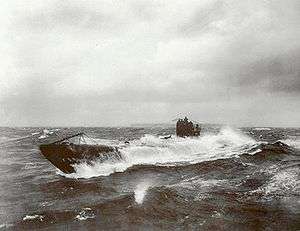SM UB-106
 UB-148 at sea, a U-boat similar to UB-106. | |
| History | |
|---|---|
| Name: | UB-106 |
| Ordered: | 6/8 February 1917[1] |
| Builder: | Blohm & Voss, Hamburg |
| Cost: | 3,714,000 German Papiermark |
| Yard number: | 312 |
| Launched: | 21 July 1917[2] |
| Commissioned: | 7 February 1918[2] |
| Fate: | sunk 15 March 1918, later raised and surrendered.[2] |
| General characteristics [2] | |
| Class and type: | German Type UB III submarine |
| Displacement: |
|
| Length: | 55.30 m (181 ft 5 in) (o/a) |
| Beam: | 5.80 m (19.0 ft) |
| Draught: | 3.70 m (12 ft 2 in) |
| Propulsion: |
|
| Speed: |
|
| Range: |
|
| Test depth: | 50 m (160 ft) |
| Complement: | 3 officers, 31 men[2] |
| Armament: |
|
| Service record | |
| Commanders: | |
| Operations: | No patrols |
| Victories: | None |
SM UB-106 was a German Type UB III submarine or U-boat in the German Imperial Navy (German: Kaiserliche Marine) during World War I. She was commissioned into the German Imperial Navy on 7 February 1918 as SM UB-104.[Note 1]
UB-106 was lost in an accident on 15 March 1918. Later raised, she was surrendered to Britain along with SM UB-86, SM UB-97, and SM UB-112. She was broken up at Falmouth in 1921.[2]
Construction
She was built by Blohm & Voss of Hamburg and following just under a year of construction, launched at Hamburg on 21 July 1917. UB-106 was commissioned early the next year under the command of Oblt.z.S. Hugo Thielmann. Like all Type UB III submarines, UB-106 carried 10 torpedoes and was armed with a 8.8 cm (3.46 in) deck gun. UB-106 would carry a crew of up to 3 officer and 31 men and had a cruising range of 7,420 nautical miles (13,740 km; 8,540 mi). UB-106 had a displacement of 519 t (511 long tons) while surfaced and 649 t (639 long tons) when submerged. Her engines enabled her to travel at 13.3 knots (24.6 km/h; 15.3 mph) when surfaced and 7.4 knots (13.7 km/h; 8.5 mph) when submerged.
References
Notes
- ↑ "SM" stands for "Seiner Majestät" (English: His Majesty's) and combined with the U for Unterseeboot would be translated as His Majesty's Submarine.
Citations
- ↑ Rössler 1979, p. 66.
- 1 2 3 4 5 6 Gröner 1991, pp. 25-30.
- ↑ Helgason, Guðmundur. "WWI U-boat commanders: Hugo Thielmann". German and Austrian U-boats of World War I - Kaiserliche Marine - Uboat.net. Retrieved 9 March 2015.
- ↑ Helgason, Guðmundur. "WWI U-boat commanders: Max Schmidt". German and Austrian U-boats of World War I - Kaiserliche Marine - Uboat.net. Retrieved 9 March 2015.
Bibliography
- Bendert, Harald (2000). Die UB-Boote der Kaiserlichen Marine, 1914-1918. Einsätze, Erfolge, Schicksal (in German). Hamburg: Verlag E.S. Mittler & Sohn GmbH. ISBN 3-8132-0713-7.
- Gröner, Erich; Jung, Dieter; Maass, Martin (1991). U-boats and Mine Warfare Vessels. German Warships 1815–1945. 2. Translated by Thomas, Keith; Magowan, Rachel. London: Conway Maritime Press. ISBN 0-85177-593-4.
- Rössler, Eberhard (1979). U-Bootbau bis Ende des 1. Weltkrieges, Konstruktionen für das Ausland und die Jahre 1935 - 1945. Die deutschen U-Boote und ihre Werften (in German). I. Munich: Bernard & Graefe. ISBN 3-7637-5213-7.